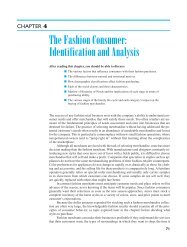Organizational Justice, Ethics, and Corporate Social Responsibility
Organizational Justice, Ethics, and Corporate Social Responsibility
Organizational Justice, Ethics, and Corporate Social Responsibility
You also want an ePaper? Increase the reach of your titles
YUMPU automatically turns print PDFs into web optimized ePapers that Google loves.
Learning<br />
Objectives<br />
After reading this chapter, you should be able to:<br />
1.<br />
2.<br />
3.<br />
4.<br />
5.<br />
6.<br />
Identify four different forms of organizational justice <strong>and</strong> the organizational impact of<br />
each.<br />
Describe strategies that can be used to promote organizational justice.<br />
Explain what is meant by ethical behavior <strong>and</strong> why organizations should be concerned<br />
about ethics.<br />
Explain ways of behaving ethically when conducting business internationally.<br />
Describe the individual <strong>and</strong> situational factors responsible for unethical behavior in<br />
organizations <strong>and</strong> methods for minimizing such behavior.<br />
Explain what is meant by corporate social responsibility, the forms it takes, <strong>and</strong> the<br />
nature of the relationship between responsible behavior <strong>and</strong> financial profitability.<br />
Preview Case<br />
The NFL: The National “Fairness” League?<br />
Parents always admonish children to “play fairly,” <strong>and</strong> doing so is expected of them even<br />
more emphatically if they grow up to be athletes. Indeed, the sanctity of athletic events is<br />
predicated on fairness. For an athlete to gain an unfair advantage by taking performanceenhancing<br />
drugs or by breaking a rule (e.g., using a “corked bat” in baseball) is not tolerated<br />
because it gives him or her an unfair advantage. Likewise, in recent years, many fans<br />
<strong>and</strong> analysts of college football have taken issue with the Bowl Championship Series<br />
(BCS) formula used to determine the national championship team on the grounds that it<br />
does not always identify the absolute best team. So outraged was Utah’s Senator Orin<br />
Hatch about the BCS formula that in the fall of 2003 he criticized the BCS method “for<br />
calling into question the notion of basic fairness.”<br />
One organization that has gone out of its way to ensure “a level playing field” for athletics<br />
is the National Football League (NFL), professional football’s official governing<br />
body. Within the NFL, a Competition Committee (composed of officials such as team<br />
owners <strong>and</strong> managers) is always tweaking the rules so as to make the game as fair as possible.<br />
As an example, consider the simple coin toss used to determine which team will kick<br />
or receive the ball when a game begins. For 22 years, this was accomplished by having the<br />
captain of the visiting team call “heads or tails” as a coin was tossed into the air by a referee<br />
before the game. Then something happened. On Thanksgiving 1998, referee Phil<br />
Luckett misunderstood the call made by the Pittsburgh Steelers’ Jerome Bettis, allowing<br />
the Detroit Lions to get possession of the ball at the beginning of a critical overtime period.<br />
To avoid such an “unfortunate incident” in the future, as then-NFL Commissioner Paul<br />
Tagliabue called it, the procedure was changed. Starting with the following weeks’ games,<br />
the heads-or-tails calls were made before the coin was tossed, thereby allowing any uncertainties<br />
to be addressed before the outcome was determined.<br />
Although this is a seemingly small thing, it can make a big difference because of the<br />
“sudden death” method used to determine winners of NFL games that are tied after the regulation<br />
60 minutes have been played. This procedure has the teams play until one team<br />
breaks the tie by scoring. At this point, although the other team might not get the ball, the<br />
game is over (unlike baseball, in which both the top <strong>and</strong> bottom halves of extra innings are<br />
played if necessary to determine a winner). For this reason, it follows that teams entering<br />
an overtime period will desire to possess the ball first. As you might imagine, however, this<br />
practice has been called into question by some critics who believe it puts too much weight<br />
41

















